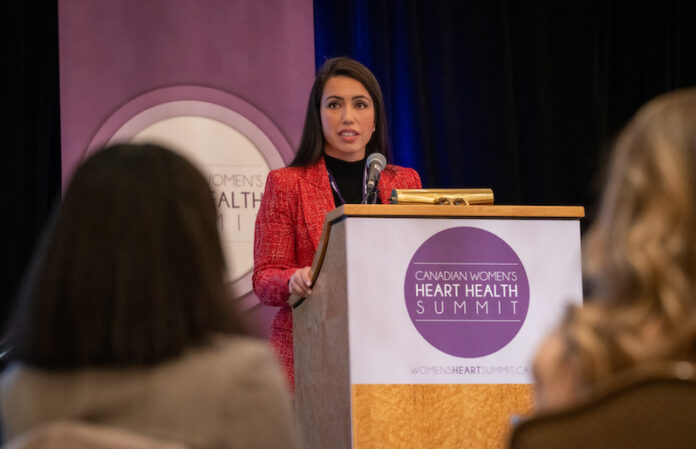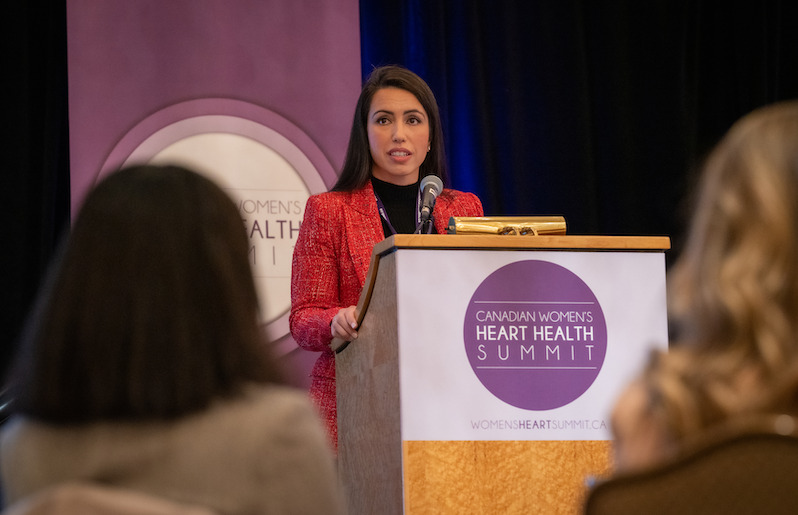
It is the most comprehensive patient education resources in the country that addresses the unique aspects of heart disease in women.
When Nazli Parast, APN, was studying to become a cardiac nurse, she was surprised at how little she learned about women’s heart health and the specific risk factors for heart disease unique to women.
Today, some fifteen years later, Nazli has a master’s degree in nursing, and she is one of the country’s only advanced practice nurses with expertise in women’s cardiovascular health.
At the University of Ottawa Heart Institute (UOHI) where she works in the women’s heart health clinic, she is passionate about educating her patients and ensuring her colleagues can learn what she was never taught as a student.
“I was disappointed nursing students don’t receive as much education [on women’s heart health] while they are completing their training,” said Nazli. “As future nurses, students must have opportunities to learn about women’s heart health so they can become better advocates for their patients.”
“Everything we know in a comprehensive, all-in-one resource”
Two years ago, Nazli began noticing a pattern in her conversations with patients of the women’s heart health clinic.
“I received many similar inquiries from women who had experienced cardiovascular events,” she remembered. “There were a lot of important questions these women had, and they kept asking me if I could refer them to something specific that could help them understand what they were going through, something that would help them connect the dots.”
At the time, no guides comprehensively addressed the specific needs and experiences of women with heart disease. Nazli recognized a gap needing to be filled.

Nazli and her team at the University of Ottawa Heart Institute organized a hybrid women’s heart health staff education day that has set the foundation for an annual education event and the development of changes to incorporate women’s heart health education into clinical practice, thus raising the standard of care and the quality of patient outcomes. In the photo above, Nazli presents her poster, “Improving Staff’s Knowledge on Women’s Heart Health,” during the Canadian Women’s Heart Health Summit in Vancouver, BC.
What began as a passion project quickly developed into something more. With the support of her colleagues, including empowerment and leadership from her manager, Bonnie Quinlan, lead physicians in the clinic at the time, Thais Coutinho, MD, and Michele A. Turek, MDCM, and significant help from her volunteer student, Ana Spasojevic, Nazli developed the first comprehensive guide tailored specifically to women with heart disease. Offered in English and French, the guide combines the expertise of several disciplines to provide women with accurate medical information all in one place.
Cardiologists, nurses, dietitians, psychologists, physiotherapists, and other medical professionals all contributed to the guide’s development, but what makes it so unique, “so powerful,” said Nazli, is that patient partners played a significant role throughout the process.
“We enrolled three patient partners in the project to review the guide during key stages of its development, to ask questions and seek clarification, and to ensure that the information presented was relevant to their individual needs,” Nazli said. Patient testimonies are included in the guide, but the names of patients are kept confidential. “The stories we share in the guide are intended to help others who may need them to connect, relate and understand their own experiences.”
“Individuals with lived experience must have a seat at the table for everything we do”
Thais Coutinho, MD recently co-chaired an international meeting of experts in women’s heart, brain, and vascular health in Vancouver, BC, during which actions to help close the gaps that prevent women from receiving the health care they need were discussed.
“It is abundantly clear that individuals with lived experience must have a seat at the table for everything we do,” she said. “Among the most important takeaways from the Canadian Women’s Heart Health Summit is the importance of including the voices of individuals with lived experience with cardiovascular disease in research, clinical programming, advocacy, and policy development. Their voices need to be heard to achieve meaningful change.”
During the Summit, patients like Michelle Logeot, who suffered cardiac arrest and a debilitating heart attack in 2017, spoke to the need for women to advocate for themselves.
Michelle, who is now 56, delivered her talk, Not taking no for an answer, to an audience of medical professionals and patients. She shared her harrowing experience with heart disease in interviews with The Toronto Star and on Global News.
“After six months of going to the doctor – knowing I wasn’t feeling well; I was sweating a lot, I was really fatigued all the time, I could barely function – many times they would misdiagnose me,” Michelle told Global News Morning BC’s Sonia Sunger. “Even though I had a strong family history of heart disease, they never looked at that.”
Michelle’s message to women is clear: “You know your body better than anyone. If you feel you have something wrong and you’re being dismissed, don’t be scared to get a second opinion or challenge your doctor. If something feels off, it likely is.”
It’s in hearing Michelle’s story – and hundreds more like it – Nazli Parast and Thais Coutinho recognize patient advocacy is not enough to address the gender gaps and inequities still present in research and healthcare today.
“It’s obvious to me that to really have a meaningful impact will require leadership from the top,” said Dr. Coutinho, who in a recorded message shared via Twitter said:
“To really close the prevention, care, and outcomes gaps for cardiovascular disease in women, we really need action to come from above. There are many of us who are health care providers and scientists who have been working on these issues from our little corners of the world and making small impacts surrounding us, but to really have meaningful and widespread impact across Canada, we need a national strategy that will be the national standard that everyone will follow.”
“Information is powerful, but it is not enough,” said Dr. Coutinho. “We are preaching to the choir and the chorus is small,” she said. “What we need now is action.”

